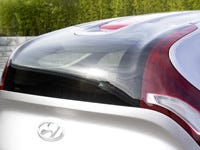As it watches its largest market, optical media, decline and sees its safety for use in beverage containers questioned, polycarbonate (PC) faces an ultimatum in coming years. “For the PC industry, it will be very important to develop new markets,” explains Adrian Beale, North American PC consultant for Chemical Market Assoc. Inc. (CMAI; Houston).
April 14, 2009
As it watches its largest market, optical media, decline and sees its safety for use in beverage containers questioned, polycarbonate (PC) faces an ultimatum in coming years. “For the PC industry, it will be very important to develop new markets,” explains Adrian Beale, North American PC consultant for Chemical Market Assoc. Inc. (CMAI; Houston). Speaking at CMAI’s recent World Petrochemical Conference in Houston, Beale also saw challenges for nylon in coming years, with engineering under pressure from advances in polypropylene (PP), particularly in the automotive market where filled PPs are actually encroaching on nylon under-the-hood strongholds.
|
Beale said CMAI is forecasting 4% annual growth for PC over the next five years, down substantially from years past, with polyamide showing slower growth of 3%/year over the next five years for resin, with fibers remaining flat.
In 2008, North America’s optical media market contracted by 10%—faster than was forecast. That shrinkage meant optical media’s share of the North American PC market sank to 18%, pushing it behind sheet/film (19%). The rest of the market was occupied by alloys (16%), auto (14%), housewares (10%), and electronics and medical (7%).
Beale said the decline in demand for CDs and DVDs will likely further drive PC suppliers to push their material into the automotive glazing market. He estimated that if the industry managed a wholesale swap from glass to PC in car glazing, it would equate to 25 kg of PC/car and represent 1.35 million tonnes of new product, roughly equivalent to 40% of the existing PC market. Engineering barriers remain, including optical quality, abrasion, and weathering, as well as technical issues like the fact that PC is a poor conductor of heat, making it much harder to defrost a PC rear window.
In terms of PC supply, Beale said near-term capacity additions will mostly come in Northeast Asia and the Middle East, including a Saudi plant that bills itself as the largest integrated PC site in the world, with a planned 260,000 tonnes/year of capacity, as well as a new facility in Russia. CMAI forecasts that PC prices will continue to weaken this year and next, and it expects 40% or North American PC capacity to go offline in 2009.
At the start of April, Dow Chemical Co. (Midland, MI) announced a $0.07/lb price increase across North and Latin America for all its PC, PC compounds, and PC blends in response to a sharp decline in prices and steep increase in raw materials and energy. The increase will be effective May 1, 2009, or as contract terms allow and affects Dow’s Calibre and Emerge resins. Dow says despite uncertainty and weakness in many of its PC end-use markets, it will seek to regain some margins after consistent price declines in PC over the last six months corresponded with a 60% run-up in benzene and 35% increase in propylene since January 2009.
In nylon, Beale stressed that glass-filled PP was increasingly encroaching on its markets, especially in low-temperature applications. In response to this pressure, Beale said nylon producers are working to increase heat stability to distance it from PP. There is also hope that a push for smaller, more fuel-efficient cars will equate to smaller engine compartments with higher temperatures that will require greater heat deflection. To keep tabs on the shifting engineering resin market, CMAI has launched a new engineering resin report, covering acrylonitrile butadiene styrene (ABS), PC, PP, nylon 6, and nylon 6/6. —[email protected]
About the Author(s)
You May Also Like



